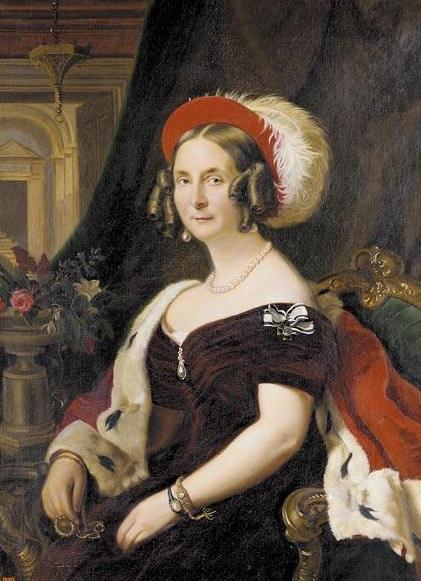|
Frederick, Hereditary Prince Of Anhalt-Dessau
Frederick of Anhalt-Dessau (27 December 1769 – 27 May 1814), was a German prince of the House of Ascania and heir to the principality (and from 1807 the duchy) of Anhalt-Dessau. He was born in Dessau, the only surviving child of Leopold III, Prince and later Duke of Anhalt-Dessau, by his wife Louise, daughter of Frederick Henry, Margrave of Brandenburg-Schwedt. His only sibling, a sister born on 11 February 1768, was either stillborn or died shortly after her birth. Life In 1786 he joined to the Prussian army, where he later obtained the rank of ''Generalfeldmarschall''. In 1805 he contracted to build Kühnauer Park. Frederick died in Dessau, three years before his father, thus never inherited Anhalt-Dessau. His place as Leopold III's heir was taken by his older son Leopold Frederick, who succeeded his grandfather in 1817 with the name Leopold IV. Marriage and issue In Bad Homburg vor der Höhe on 12 June 1792 Frederick married Landgravine Amalie of Hesse-Homburg (b. Homb ... [...More Info...] [...Related Items...] OR: [Wikipedia] [Google] [Baidu] |
Landgravine Amalie Of Hesse-Homburg
, title = Hereditary Princess of Anhalt-Dessau , image = Johann Friedrich August Tischbein - Christiane Amalie Erbprinzessin von Anhalt-Dessau.jpg , caption = , reign = , coronation = , predecessor = , successor = , succession = , spouse =Frederick, Hereditary Prince of Anhalt-Dessau , issue = Auguste, Princess of Schwarzburg-RudolstadtLeopold IV, Duke of Anhalt Prince George BernhardPrince Paul Christian Louise, Landgravine of Hesse-Homburg Prince Frederick AugustusPrince William Waldemar , house =Hesse-Homburg , father =Frederick V, Landgrave of Hesse-Homburg , mother = Princess Caroline of Hesse-Darmstadt , birth_date = , birth_place = Bad Homburg vor der Höhe, Landgraviate of Hesse-Homburg, Holy Roman Empire , death_date = , death_place = Dessau, Duchy of Anhalt-Dessau Princess and Landgravine Christiane ''Amalie'' of Hesse-Homburg, full German name: ''Christiane Amalie, Landgräfin von Hessen-Homburg'' (29 ... [...More Info...] [...Related Items...] OR: [Wikipedia] [Google] [Baidu] |
Leopold IV, Duke Of Anhalt-Dessau
Leopold IV Frederick, Duke of Anhalt (1 October 1794 – 22 May 1871) was a German prince of the House of Ascania. From 1817 until 1853 he was ruler of the duchy of Anhalt-Dessau and from 1847 until 1853 also ruler of the duchy of Anhalt-Köthen. From 1853 until 1863 he was the ruler of the joined duchy of Anhalt-Dessau-Köthen and from 1863 the first ruler of the united duchy of Anhalt. Early life Leopold was born in Dessau on 1 October 1794 as the eldest son of Frederick, Hereditary Prince of Anhalt-Dessau, by his wife Landgravine Amalie of Hesse-Homburg, daughter of Frederick V, Landgrave of Hesse-Homburg. Following the premature death of his father in 1814, he became heir to the duchy of Anhalt-Dessau. Reign Following the death of his grandfather Leopold III he succeeded as duke on 9 August 1817. During the Revolutions of 1848 he was forced to grant a constitution to Dessau on 29 October 1848. It was revoked, however, on 4 November 1849, then replaced with a new version ... [...More Info...] [...Related Items...] OR: [Wikipedia] [Google] [Baidu] |
People From Dessau-Roßlau
A person (plural, : people) is a being that has certain capacities or attributes such as reason, morality, consciousness or self-consciousness, and being a part of a culturally established form of social relations such as kinship, ownership of property, or legal obligation, legal responsibility. The defining features of personhood and, consequently, what makes a person count as a person, differ widely among cultures and contexts. In addition to the question of personhood, of what makes a being count as a person to begin with, there are further questions about personal identity and self: both about what makes any particular person that particular person instead of another, and about what makes a person at one time the same person as they were or will be at another time despite any intervening changes. The plural form "people" is often used to refer to an entire nation or ethnic group (as in "a people"), and this was the original meaning of the word; it subsequently acquired its us ... [...More Info...] [...Related Items...] OR: [Wikipedia] [Google] [Baidu] |

_1938.jpg)